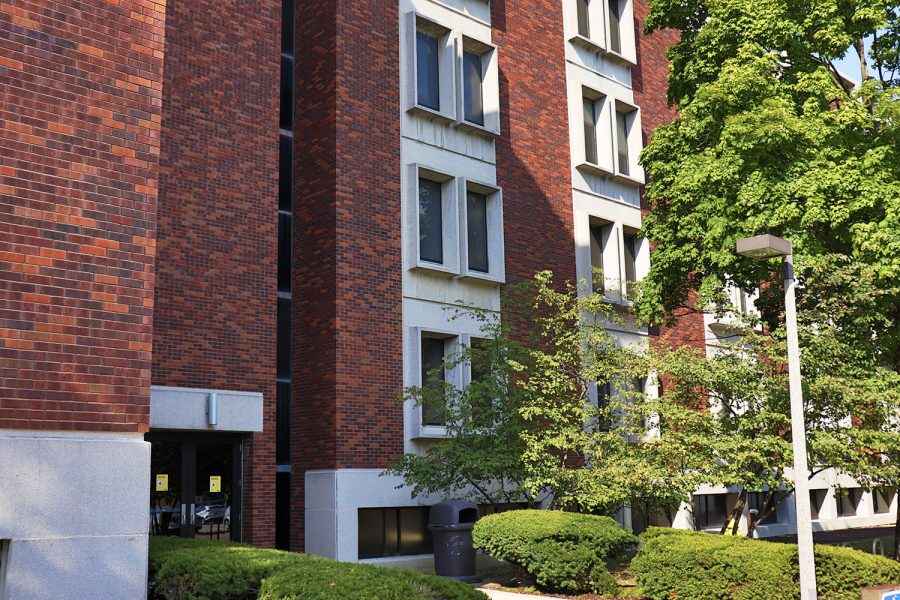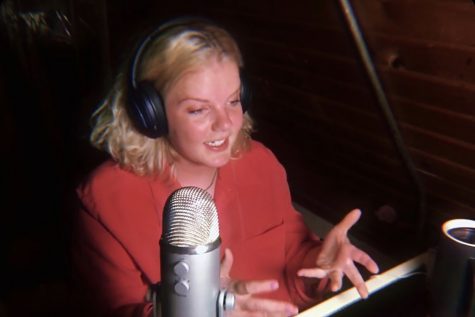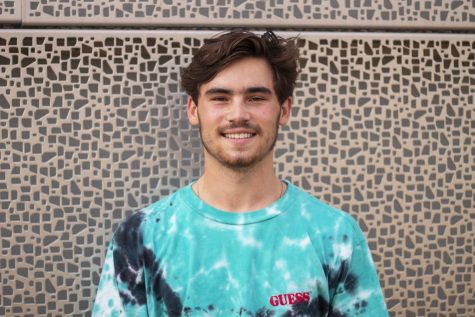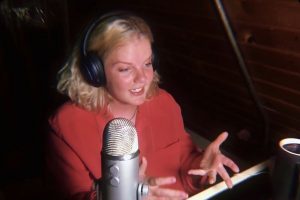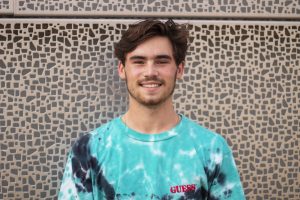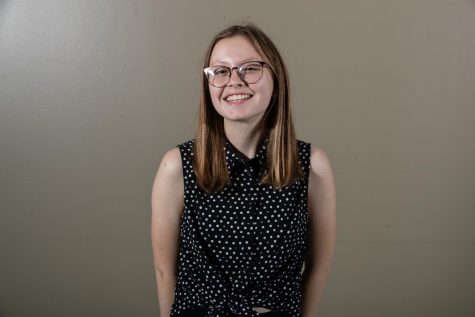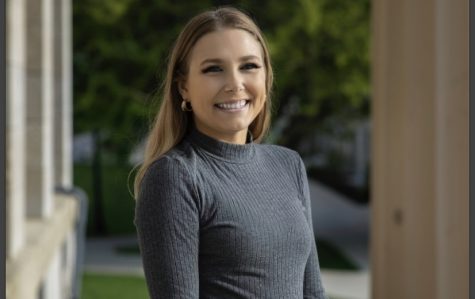UI Nonfiction Writing Program sees changes going into fall semester
Along with a transition to a new home on the way, NWP faculty and staff have pledged to adopt some changes after an advocacy group formulated a list of 10 demands to implement in the program.
The English-Philosophy Building is seen on Wednesday, Aug. 26, 2020.
August 26, 2020
Amid a summer of protests and societal push for change, the University of Iowa’s Nonfiction Writing Program will see both internal and external shifts in the near future, starting immediately this fall.
Students have called for the program to become a more racially equal, diverse environment to learn in. All the while, program administrators are amid planning to move from its location in the English-Philosophy Building to the Sanxay-Gilmore House, one of the oldest documented buildings in Iowa City.
The property is in the midst of being relocated and renovated by the UI, where it will become part of the university’s “writing neighborhood,” as described by UI Senior Vice President of Finance and Operations Rod Lehnertz in a June 29 virtual state Board of Regents meeting. The house is near the Dey House and the Shambaugh House, the homes of the Iowa Writers’ Workshop and International Writing Program, respectively.
“This would continue to advance the idea … of homes, historic structures that host important and frankly nationally and internationally recognized writing programs, in what we affectionately call the writing neighborhood,” Lehnertz said at the meeting.
The target move-in date, according to former Nonfiction Writing Program Director John D’Agata, is in fall 2021. Now that a new home for the program is official, D’Agata decided to step down from his position after seven years in order to focus more on writing and teaching.
“I’ve quietly been trying to step down as the NWP’s director for the past few years because I’ve never believed that art is served well under dynasties,” D’Agata said in an email to The Daily Iowan. “I think it flourishes best under change and flexibility and surprise. Art isn’t meant to plant roots in the status quo; it’s meant to look beyond what’s happening now and imagine what else is possible. So, I’m excited to see the visions that the program’s next few directors will bring to the NWP.”
While English department head Loren Glass said the program’s official move to the house may be delayed due the coronavirus pandemic, the eventual relocation will allow the program to have its own space, like other UI writing programs already do. The Nonfiction writing Program will still be part of the English department.
“They are the best nonfiction writing program in the country,” he said. “I think they wanted to sort of have their own autonomous space and identity. I think it’ll be good for them to be out in the writing community in the city of literature, like all the other writing programs.”
RELATED: Iowa regents approve property transfer to allow relocation of historic Iowa City home
D’Agata said the program has been searching for a home of its own since the late ‘90s — when D’Agata was a student in the program. The UI found a house on Clinton Street for the program in 2008, however that year’s flood caused the university to steer its attention toward arts buildings in need of new homes.
Then, five years ago, a few donors bestowed gifts to the Nonfiction Writing Program that were specific to finding a home for the program.
“So, we used that as an opportunity to remind the University that we were still looking for a space of our own,” D’Agata said. “Fortunately, the Sanxay-Gilmore house became available at that time, and thanks to an impressive collaboration between the University and Iowa City it’ll now have a new life as a center for making great art.”
Though it’s too early to tell what the house’s interior will look like, D’Agata said the building will include classrooms, faculty and student offices, a lounge, and a library. He said he hopes there will also be a space that caters to the program’s events, such as readings and lectures.
Whenever D’Agata thinks about the purpose of having a building for the program, he said he recalls what a donor said to him when explaining why she gave to the program.
“She said, ‘Your students are the best young nonfiction writers in the country; they deserve a building that reflects that,’” D’Agata said. “So that’s what we’ll do with the space; we’ll use it to nurture the extraordinary talents of the undergraduate and graduate students who come to Iowa to study nonfiction, giving them a dedicated place in which to experiment, learn, and build a community that will support them for their whole creative lives.”
Though the move may be eventual, more immediate changes within the program are already taking place. On July 6, faculty in the program published a response to a letter that had been addressed to them and former director John D’Agata by 28 students within the program.
RELATED: UI Diversity Councils dissatisfied with UI leaders’ Black Lives Matter response
The students’ letter demanded change within the writing program, addressed student concerns, and highlighted the program’s lack of response toward the Black Lives Matter movement. The students detailed a list of 10 action items to be implemented by the program, including a plan for the program’s next hire to be Black and to require a yearly bias workshop for all incoming students and faculty.
“Black students should be able to spend their time focusing on craft instead of losing energy dealing with racist encounters with faculty, staff, and students,” students wrote in the letter. “Black students should not have to do extra work, on top of course and teaching loads, to receive the same quality of education that non-Black students are afforded by default. Despite past communications from students regarding these issues, whether asking for diverse faculty members, admissions panels, and syllabi, or addressing microaggressions as a community, there has been no concrete change that we’ve seen.”
The DI reached out to students who wrote the letter, but they declined to comment at this time.
In their response two days later, faculty stated that they would address all the changes that the students requested in order to make changes within the program.
While the letter stated that some of the changes will take time, the program has already committed to having a more diverse pool of application screeners by the next round of admissions to the program, including statements in the Nonfiction Writing Program faculty’s fall syllabi outlining plans and resources to address racism in the classroom, texts by more Black writers in their syllabi “without tokenizing or holding them separate from the canon,” and allowing all program students to count more than one outside course toward their degree.
Incoming Nonfiction Writing Program Associate Professor in English Melissa Febos said she was inspired by the students’ letter when she read it and is “thrilled” to be teaching the students who wrote it. Febos said she has already drafted a statement in her syllabus about creating an anti-racist atmosphere that she will insist upon for all of her classes.
“It seems to me that [what] they’re asking for in the program and the department is the kind of change that needs to be happening in programs all over the country, so I feel really grateful to be joining the department at the time of this reckoning when it seems that they’re poised to make some really needed changes,” she said.
Created in June, the @blackatiowawriters Instagram account provides a space for Black UI students, alumni, faculty, and staff to share stories of racism and mistreatment within the English department. Several people addressed their concern with the Nonfiction Writing Program by posting the students’ demands and other stories from the program.
One post specifically named D’Agata, alleging that he was part of the reason why so few graduates from the program over the past seven years have been Black.
Becasue D’Agata does not use any form of social media, he said he could not speak on the details of the Instagram post, but does acknowledge the frustration toward the program in regards to its pace of constructing more diversity and inclusion, along with how the program and the UI can improve support for Black students.
D’Agata said that several issues that have been brought to light are ones that the program has already been working toward, but that some institutional progress isn’t always visible until it’s accomplished. D’Agata said the English Department directed a search for new faculty in 2014, 2017, 2018, and 2019, where writers of color were their top candidates.
“I chaired three of those searches, and I sat on the committee of the fourth, and I can tell you it’s frustrating for faculty too when we’ve got an amazing writer in front of us whom we want to hire but can’t offer a competitive enough salary to convince that writer to come,” he said.
Departments do not control salary packages, D’Agata added, but the university’s administration does.
“It can be more than frustrating when we aren’t able to hire the faculty we’re trying to recruit; it has actually been quite heartbreaking to see these writers go to other universities,” D’Agata said.
Despite frustrations and the changes that lie ahead, incoming Nonfiction Writing Program Interim Director Meenakshi Gigi Durham previously told the DI that she is excited to bring her multicultural and transnational standpoint to the table.
“I particularly look forward to advancing issues of racial and social justice in the program,” Durham said in an email to the DI. “I’m really excited about the new ideas, visions, and challenges the program is engaging with as we begin a new academic year, and I can’t wait to work with these talented new colleagues and students.”
The program has started to embed some new changes, D’Agata said, but some may take more time to implement than others.
“Other changes will take more time, but the NWP considers its letter of response to our students a contract, and we are committed to fulfilling it,” he said.



